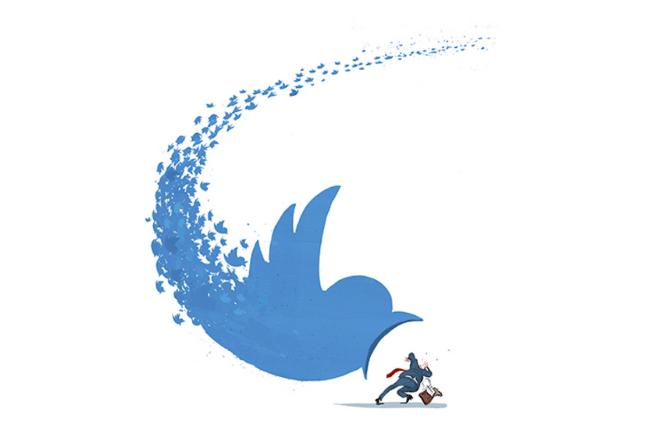Earlier this month, there was a bit of a fuss when the Co-op’s Twitter account said it would not be advertising in The Spectator due to our coverage of transgender issues. This is a pernicious trend in the media and The Spectator has a policy of refusing to deal with corporates who indulge in such cancel culture. It’s a firm principle of ours, but not one I expected to apply to the Co-op — the British grocery store is one of the few outfits to have explicitly stated its commitment to diversity of opinion.
I emailed the Co-op to ask what on earth had happened, and tried (unsuccessfully) to convey how serious this was. As I suspected they had been targeted by a troll farm called Stop Funding Hate which goes after corporates who advertise in publications with which they disagree. The idea is to find 30 or 40 activists — sometimes far fewer — to target the corporation’s Twitter account and persuade the social media manager that there’s some kind of a national uproar. If this trick works, the terrified social media team cave to their demands and offer some kind of apology for advertising in the target — without realizing what they have just dragged their company into. In this case, a Twitter account called ‘Lisa Fajita’ had complained and ‘Alice’ from the Co-op social media team replied with news of the ban.
The theory behind Stop Funding Hate is that publications get most of their money from advertisers, not readers — so pressure exerted via advertisers can work. And that the financial managers of a publication are the weak link. If you threaten the revenue, the money will clip journalists’ wings. This theory doesn’t quite work at The Spectator where advertising revenue is dwarfed by support from readers and the financial side of things is overseen by Andrew Neil. He takes a dim view of such tactics. When the Co-op tweeted that they’d binned us, he immediately announced that they were banned.
I think it’s fair to say that none of us expected what happened next. People, it seems, have had their fill of cancel culture and we ended up with over 1,000 subscriptions: our own Co-op dividend. But then, things started to rebound on the Co-op. People were threatening not to shop there. At one stage, Iain Martin said he was taking away his wine order from the Co-op — as anyone who knows Iain can attest, that would represent quite a financial hit. An analysis for PR Week found that this debacle overshadowed any other Co-op social media intervention. Indulging in cancel culture turned out to be a branding disaster.
Only then did this reach the top of the Co-op. As I suspected all along, its chief executive had no knowledge of what his underlings had been up to. He emailed Andrew and I to explain that the social media team had it wrong: the agency had not been instructed to dump The Spectator. Our policy of a ‘lifetime ban’ is to make it clear to corporates that they cannot coming crawling back once the Twitterstorm is over — and make a private apology to a publication it publicly condemns. But with the Co-op, we have accepted that this was genuinely a mistake.
It was a slip, so we have made up. We have an advert from them appearing next month. And we ordered some of their own-brand champagne to the office and tried it after an episode of Spectator TV: it won a blind-tasting challenge with Moet, Veuve Clicquot and Bollinger. (It didn’t beat Pol Roger, but nothing does.)
Three takeaways from this wee drama:
1. Cancel culture is now rebounding on corporates who engage with it
The joke — go woke, go broke — contains some truth. Companies wisely stay out of party political battles, so why enter the culture wars and disparage a chunk of your customers? Virgin Rail found this out when they were fooled by Stop Funding Hate into dumping the Daily Mail from its carriages: Richard Branson ended up overruling his marketing department and publishing a personal apology.
2. There is a risk in asking a junior social media person to speak for the whole company
The social media person is asked to respond to complaints on Twitter: was your delivery late? A fly in your soup? Please accept our apologies etc. These statements are issued quickly. It’s a weak link, targeted by Twitter trolls to try to fool the social media team into saying ‘seen an advert against an article you disagree with? Or, sorry, regard as ‘hate speech’? OK, sorry, we won’t advertise with this publication’. As easily as that, a firm can end up accidentally aligning itself with cancel culture.
3. Publications ought to get together, and stand firm on advertisers who engage in cancel culture
Serving readers ought to be the sole focus of any publication: there’s a longstanding tradition in Britain that advertisers do not seek to influence what is published. This editorial independence from commercial pressures is worth defending — and if that means losing revenue from a small number of social warrior corporates then it’s a price well worth paying. As The Spectator has found. This is not a left vs right battle. One of the trolls’ complaints for us, this time around, was that we ran a piece by Suzanne Moore of the Guardian. A while ago, one of The Spectator’s bigger advertisers had a problem with comments made by Matthew Parris. Let’s just say that they’re not a big advertiser now.
[special_offer]
The Spectator is very lucky: we’re family-owned by proprietors who would rather lose money than gave an inch to advertisers who threaten our editorial independence. Keeping faith with readers — serving them original and provocative opinions by brilliant writers as we have been doing since 1828 — pays off. Andrew Neil ended up joking that he hopes ‘there are other woke advertisers ready to follow Co-op’s example.’ At least, I think he was joking.
A final word about the Co-op. The irony here is that it has already faced down the cancel culture brigade within its own ranks. It respectfully heard their case, but replies that it has a duty to ‘recognize the diversity of our members and customers, that don’t suppress the freedom of the press, which is a fundamental part of a democracy.’ It adopted the following policy: ‘We will not seek to affect the editorial independence of publications or channels. We will not undermine the commercial value of our society for our members. We will ensure our values and principles are clear and undiminished regardless of surrounding content.’
So what happened between us was genuinely a misunderstanding. The Co-op is one of a handful of companies (Vodafone, Virgin) that do have an explicit policy of rejecting cancel culture. We’re proud to run an advert from them in a forthcoming issue, and are pleased to put this farrago behind us.
This article was originally published onThe Spectator’s UK website.

























